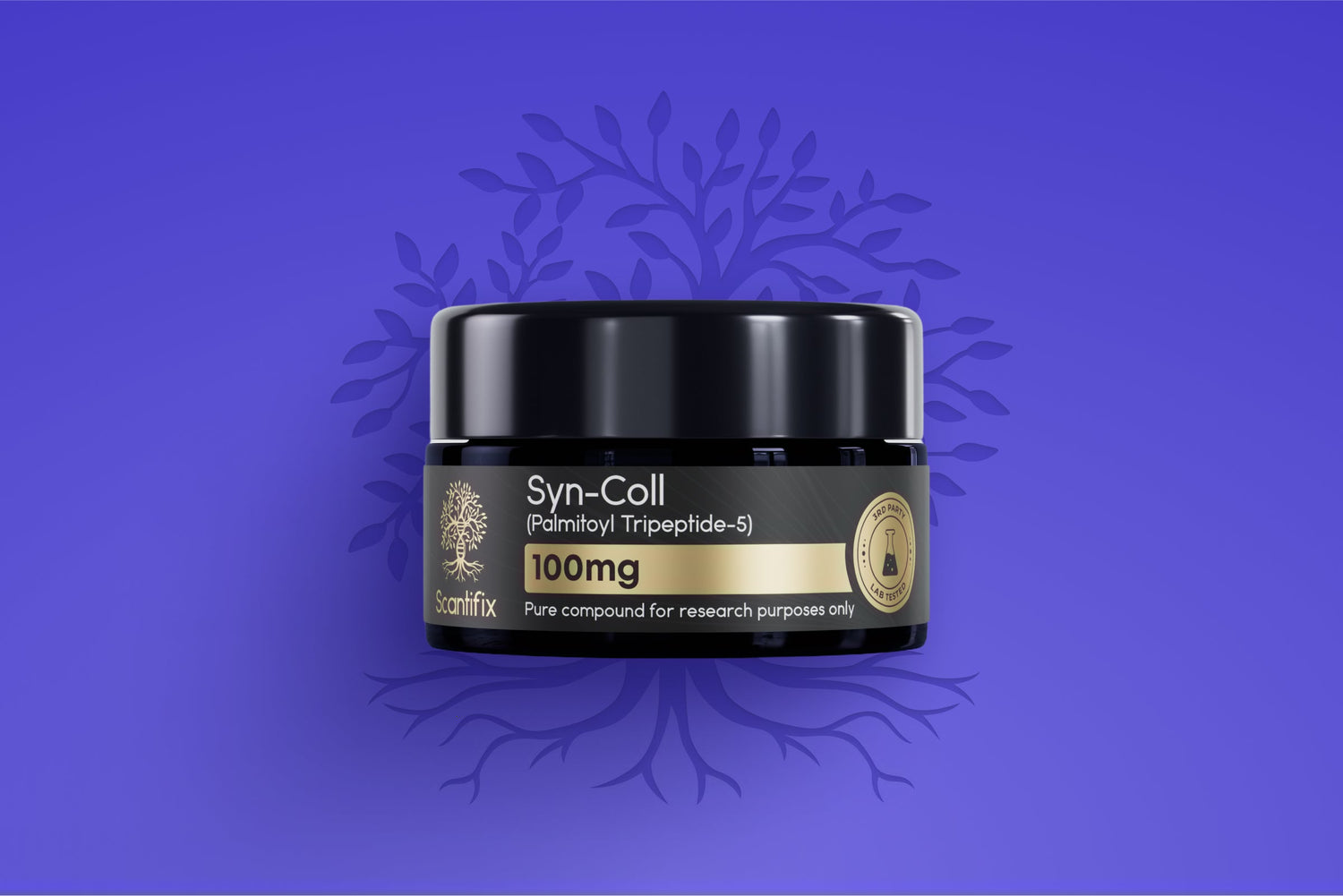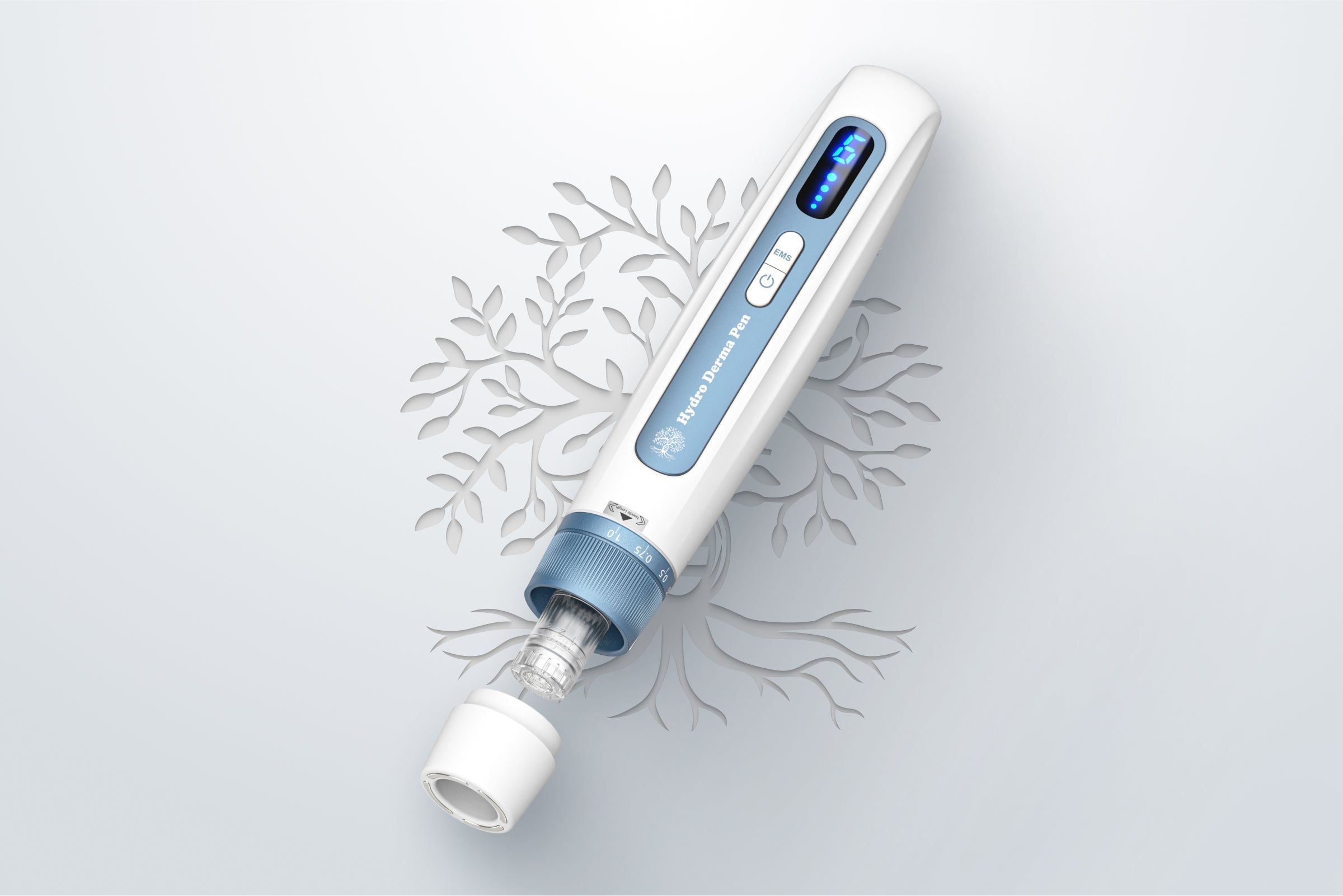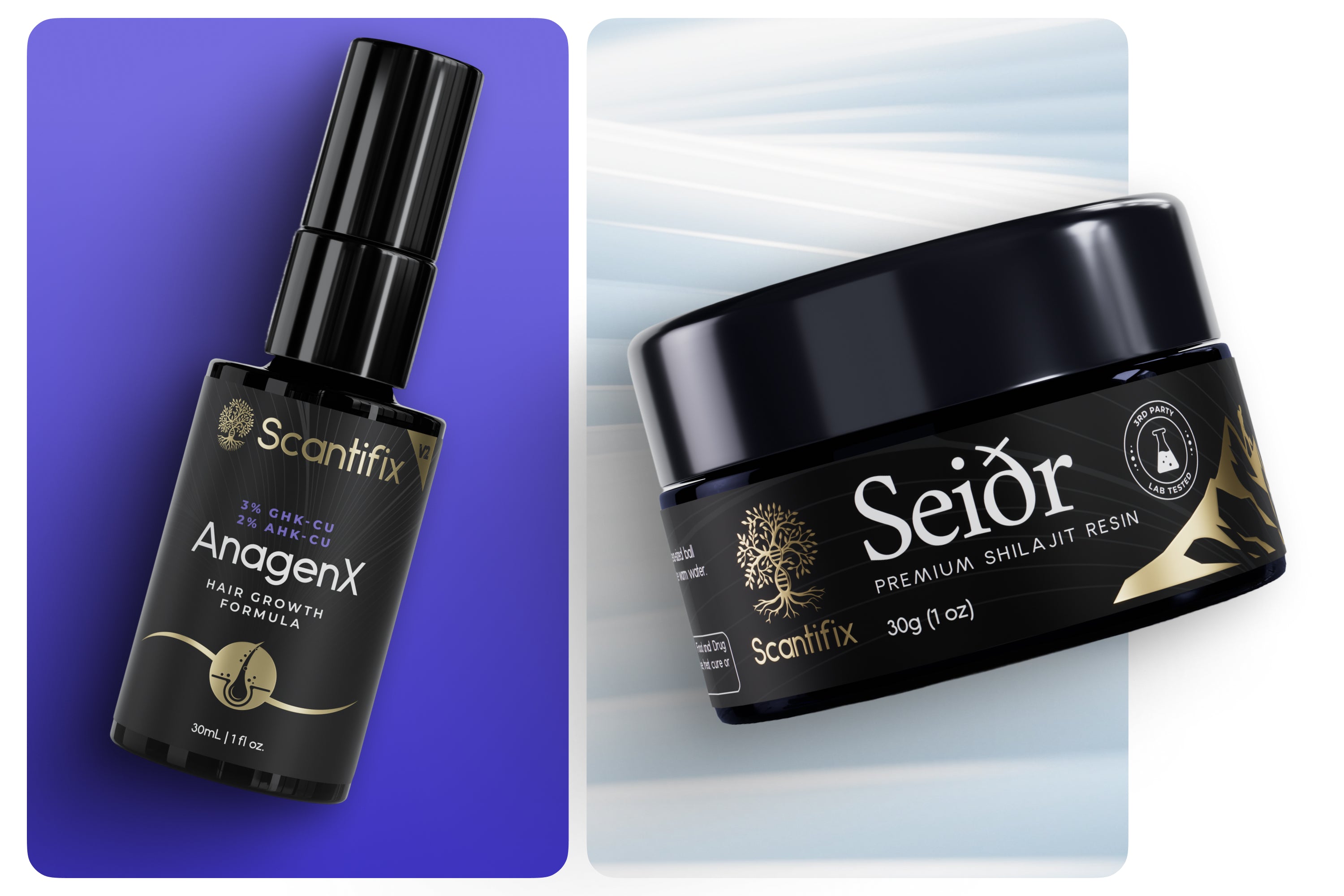As we age, our skin gradually loses collagen, a structural protein that gives it strength, elasticity, and a smooth, youthful appearance. Many skincare products offer quick, superficial fixes but peptides can go deeper to support the skin’s own collagen-building process.
One of the most advanced peptides for this is Syn-Coll, also known as Palmitoyl Tripeptide-5. This peptide was carefully developed to work deep within the skin’s signaling pathways to stimulate collagen production and reduce its breakdown.
Peptide technology offers an upgrade from your run-of-the-mill anti-aging cream, and science backs it up. Let’s take a look at Syn-Coll and its collagen-boosting benefits to help you decide if it's the right addition to your skincare routine.
What Is Syn-Coll?
Syn-Coll is a common name for Palmitoyl Tripeptide-5, a synthetic signal peptide developed to help reduce visible signs of aging by enhancing the skin’s natural ability to produce collagen. Structurally, it’s a tripeptide—a short chain of three amino acids—linked to palmitic acid, a fatty acid that helps the molecule penetrate the lipid-rich outer layer of the skin.
Traditional moisturizers or collagen creams simply sit on the surface, but Syn-Coll interacts with cellular receptors in the deeper layers of skin. It mimics the body’s own signaling molecules that tell skin cells when to produce more collagen.
That makes Syn-Coll part of a unique class of biomimetic peptides that can imitate natural processes to restore skin health from within.
How Syn-Coll Works in the Skin
Syn-Coll works by stimulating fibroblasts, the skin cells responsible for producing structural proteins like collagen and elastin. It does this by mimicking a natural messenger peptide, one that normally signals your skin to repair and regenerate.
Let’s break down the two main ways Syn-Coll helps improve your skin:
1. Boosting Collagen Production
Syn-Coll binds to TGF-β (Transforming Growth Factor Beta) receptors on fibroblasts. These receptors play a central role in regulating collagen production. When Syn-Coll gets involved, it encourages your skin to ramp up its output of Type I and Type III collagen, the two main types that give skin its firmness and elasticity.
2. Protecting Existing Collagen
Syn-Coll also helps stop collagen from breaking down too quickly. It does this by reducing the activity of enzymes called matrix metalloproteinases (MMPs), which naturally wear down collagen over time. By keeping those enzymes in check, Syn-Coll helps your skin hold onto the collagen it already has and maintain its structure longer.
So how does that translate into everyday results? Let’s break down what Syn-Coll can actually do for your skin.
Syn-Coll Peptide Benefits
Thanks to how it works and how easily most skin types tolerate it, Syn-Coll comes with a long list of potential skin benefits backed by clinical research:
-
-
Improves firmness and elasticity
By increasing collagen density and supporting skin structure, Syn-Coll helps restore the resilience that declines with age. In clinical trials, 77% of participants reported visibly improved skin firmness and elasticity after just 4 weeks of use. -
Reduces the appearance of fine lines and wrinkles
Clinical studies demonstrated that Syn-Coll reduced wrinkle appearance by 7–12% when used twice daily for 84 days. It was shown to be 3.5 times more effective than placebo in reducing wrinkle depth. -
Enhances skin texture and smoothness
Increased collagen production and reduced collagen breakdown leads to a more refined surface, with better tone and texture. Research shows that 60% of study participants noticed a reduction in the appearance of pores after 4 weeks of treatment. -
Supports long-term structural repair
Unlike fast-acting fillers or harsh resurfacing treatments, Syn-Coll works gradually by guiding the skin's own biology toward repair. Studies indicate it may increase collagen synthesis by up to 119% while also helping to prevent collagen loss by reducing the activity of collagen-degrading enzymes. -
Gentle and non-irritating
Because it works with skin signaling rather than through exfoliation or inflammation, Syn-Coll is suitable for sensitive or reactive skin types. Comprehensive clinical testing has confirmed its safety for cosmetic use across all skin types.
-
Improves firmness and elasticity
(Trookman et al., 2009)
Not only does Syn-Coll deliver measurable results, but it's extremely versatile. Let’s look at the different ways Syn-Coll shows up in skincare products.
Syn-Coll Products
Syn-Coll is a water-soluble and stable peptide, making it easy to use in several different formats ranging from high-purity actives to everyday creams.
Raw Syn-Coll Peptides
Available in lyophilized (freeze-dried) powder form, raw Syn-Coll peptides are ideal for formulators, researchers, and DIY users looking for maximum control. These peptides are typically reconstituted with sterile water or specialized carriers, allowing users to experiment with concentrations, textures, and complementary ingredients.
Professional Serums and Creams
You’ll also find Syn-Coll in a variety of ready-to-use anti-aging serums, eye creams, and firming moisturizers. Because of its wide compatibility, you'll often find it blended with other active ingredients, including:
-
- Hyaluronic acid for hydration
- Vitamin C for antioxidant support and brightness
- Ceramides for barrier strength
Custom and DIY Skincare
For users who like to mix their own serums or enhance existing products, Syn-Coll can also be added into custom skincare routines. It pairs well with other peptides, moisturizers, and barrier-repair ingredients, making it perfect for those looking to personalize their anti aging treatment.
Now that we’ve covered the different ways Syn-Coll is used in skincare, let’s look at how to spot high-quality Syn-Coll products and what sets the best formulations apart.
Best Syn-Coll Peptide Products
Unfortunately, not all peptide products are created equally. Some peptide products have low purity or quality of active ingredients and can contain fillers. When selecting a product that features Syn-Coll, here are a few things to keep in mind:
-
- Purity: High-grade Syn-Coll should be third-party tested for purity and ideally be 98% pure or higher.
- Clean formulation: No unnecessary fillers or irritating ingredients like fragrances, specially if you’re using Syn-Coll long-term.
- Transparency: What you put on your skin matters, so look for products that clearly list all ingredients, concentrations, and certificates of analysis (COA's), like you'll find in our store.
- Storage: Peptides like Syn-Coll are sensitive to light and temperature, so they should be stored in protective packaging like Miron Violetglass, which helps filter light and preserve potency.
Syn-Coll vs. Other Collagen-Stimulating Peptides
If you're trying to determine if Syn-Coll is a good fit for your skincare routine, it can be helpful to understand how it compares to other well-known peptides that support collagen production and skin firmness. Let's take a look.
SYN-COLL VS. MATRIXYL (PALMITOYL PENTAPEPTIDE-4)
Matrixyl is one of the most studied peptides in skincare and works by mimicking a collagen fragment to trigger repair. While Matrixyl supports both collagen and elastin, Syn-Coll goes a step further by also inhibiting enzymes that break collagen down. For those looking to maintain skin firmness and prevent visible sagging over time, Syn-Coll offers a more targeted, twofold approach.
SYN-COLL VS. GHK-CU
GHK-Cu is a copper peptide known for wound healing, anti-inflammatory effects, and skin regeneration. It stimulates collagen production but also supports skin health more broadly by helping form new blood vessels, protecting against oxidative damage, and encouraging cell renewal. Syn-Coll is more narrowly focused on boosting and preserving collagen, making them highly complementary in more advanced skincare routines.
SYN-COLL VS. PALMITOYL TRIPEPTIDE-1
Palmitoyl Tripeptide-1 is often paired with Palmitoyl Tetrapeptide-7 in anti-aging blends (like Matrixyl 3000) to stimulate collagen and reduce inflammation. Compared to Syn-Coll, it has a gentler action and is typically used for more general age-related concerns. Syn-Coll may be a better choice when firming and visible wrinkle reduction are the priority.
SYN-COLL VS. GHK-BIOTIN
GHK-Biotin combines the collagen-supporting tripeptide GHK with biotin, a B-vitamin known for boosting skin and hair health. Its benefits span from improving skin hydration and texture to supporting scalp vitality. While both peptides help increase collagen, GHK-Biotin has broader applications, whereas Syn-Coll takes a more specialized approach—focusing specifically on stimulating collagen production and preventing its breakdown for targeted firming and wrinkle-reducing effects.
Final Thoughts: Is Syn-Coll Right for Your Routine?
Syn-Coll is a well-established peptide with a clear biological role: encouraging your skin to rebuild its own collagen and resist the breakdown that comes with time. It’s especially valuable for anyone looking to improve skin firmness, reduce visible lines, or support long-term skin structure without relying on harsh or irritating ingredients.
At Scantifix, we offer high-purity, topical Syn-Coll that meets the highest standards for ingredient quality and transparency. That means transparent 3rd party testing, absolutely no fillers, protective packaging, and expert support when you need it. We want your experience with peptides to be safe and easy so that you can focus on what matters: real results.
References:
Trookman, N. S., Rizer, R. L., Ford, R., Ho, E., & Gotz, V. (2009). Immediate and long-term clinical benefits of a topical treatment for facial lines and wrinkles. Journal of Clinical Aesthetic Dermatology, 2, 38–43.










Leave a comment
All comments are moderated before being published.
This site is protected by hCaptcha and the hCaptcha Privacy Policy and Terms of Service apply.